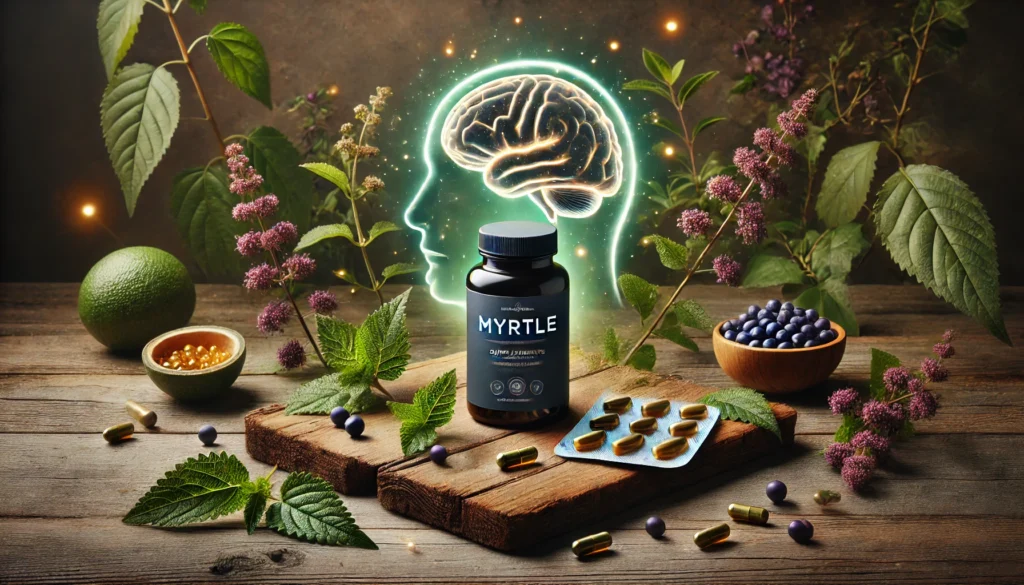Myrtle (Myrtus communis), a plant native to the Mediterranean region, has long been admired for its ornamental beauty and aromatic leaves. In recent years, it has attracted attention for its potential health benefits, particularly in the realm of cognitive enhancement. As the demand for nootropic supplements—substances believed to improve mental performance—continues to grow, Myrtle has emerged as a subject of interest for researchers exploring natural compounds that may support brain function. This article provides a thorough review of Myrtle, including its active ingredients, chemistry, physiological mechanisms, potential nootropic benefits, dosing recommendations, side effects, interactions with other supplements and medications, and safety considerations.
You May Also Like:
Myrtle: Potential Nootropic Benefits, Dosage, Side Effects, Interactions and Other Important Information About This Supplement is an original (NootropicsPlanet) article.
Sources of Myrtle
Myrtle is a shrub or small tree commonly found in the Mediterranean region, particularly in countries like Greece, Italy, and Spain. The plant’s most notable parts used for medicinal purposes are the leaves, berries, and essential oil. These components are rich in a variety of bioactive compounds, including flavonoids, essential oils, and polyphenolic compounds, which are thought to contribute to Myrtle’s potential therapeutic effects.
Myrtle has been traditionally used in herbal medicine for a variety of ailments, ranging from respiratory issues to digestive disturbances. The plant’s leaves and berries are typically consumed in the form of extracts, teas, or tinctures, while the essential oil is used for aromatherapy and topical applications. Increasingly, Myrtle is being explored as a nootropic supplement due to its neuroprotective and cognitive-enhancing properties.

Chemistry of Myrtle
Myrtle contains several bioactive compounds, but the primary contributors to its nootropic potential are flavonoids, essential oils, and tannins. The two most studied compounds in Myrtle for their cognitive effects are myrtucommulone (a compound from the essential oil) and quercetin, a type of flavonoid.
- Myrtucommulone: This compound, found in the essential oil of Myrtle, is a potent anti-inflammatory agent. It has been shown to possess neuroprotective properties, possibly through its ability to reduce oxidative stress and inflammation in the brain. It may also enhance cognitive function by promoting neuronal health and function.
- Quercetin: A flavonoid found in high concentrations in Myrtle, quercetin is known for its antioxidant and anti-inflammatory effects. Research suggests that quercetin has the ability to cross the blood-brain barrier, making it a potential candidate for cognitive enhancement. It acts as a free radical scavenger, reducing oxidative damage in the brain and supporting overall neuronal function. Studies have also indicated that quercetin may enhance learning and memory, particularly in models of neurodegenerative diseases.
- Essential Oils: Myrtle essential oil is composed of a variety of terpenes and phenolic compounds, including 1,8-cineole (eucalyptol), alpha-pinene, and linalool, which are known for their cognitive-enhancing properties. These compounds have been shown to improve focus, alertness, and memory by enhancing cerebral circulation and exerting calming effects on the nervous system.
These compounds work synergistically to provide neuroprotective benefits, possibly improving mental clarity, focus, and memory retention. Myrtle’s antioxidant properties help mitigate oxidative stress, a key factor in age-related cognitive decline and neurodegenerative diseases like Alzheimer’s and Parkinson’s disease.
Physiological Mechanisms of Myrtle in the Body and Brain
Myrtle’s potential as a nootropic supplement is tied to its ability to influence key physiological processes in the brain, including oxidative stress reduction, inflammation modulation, and neurogenesis (the creation of new neurons).
- Antioxidant Action: One of the most significant mechanisms through which Myrtle may exert its nootropic effects is by acting as a powerful antioxidant. The flavonoids and polyphenols in Myrtle help neutralize reactive oxygen species (ROS), which are harmful byproducts of cellular metabolism. ROS can damage neurons and are implicated in several cognitive disorders. By reducing oxidative stress, Myrtle may protect neurons from age-related degeneration and support overall cognitive health.
- Anti-inflammatory Effects: Chronic inflammation is another factor contributing to cognitive decline and the progression of neurodegenerative diseases. Myrtle’s anti-inflammatory compounds, particularly myrtucommulone and quercetin, help modulate brain inflammatory pathways. Myrtle may promote neuronal health and improve cognitive function by reducing neuroinflammation, particularly in individuals with conditions such as Alzheimer’s or mild cognitive impairment.
- Neurogenesis and Neuroplasticity: Some studies suggest that compounds in Myrtle may stimulate neurogenesis and enhance neuroplasticity—the brain’s ability to form new connections and adapt to new information. This effect is critical for learning, memory, and overall cognitive performance. While more research is needed, these properties make Myrtle an exciting candidate for promoting long-term brain health and cognitive enhancement.

Nootropic Benefits of Myrtle
As a nootropic, Myrtle’s potential benefits lie in its ability to enhance memory, focus, and overall cognitive function. While the research is still in its early stages, the following areas show promise:
- Cognitive Enhancement: The antioxidants and anti-inflammatory compounds in Myrtle, particularly quercetin, may enhance brain function by improving cerebral circulation and reducing oxidative damage. This could lead to improved memory, focus, and mental clarity, particularly in aging individuals or those under cognitive stress.
- Neuroprotection: Myrtle’s ability to reduce oxidative stress and inflammation may help protect the brain from damage due to free radicals and neuroinflammation. This neuroprotective effect is especially relevant in the context of neurodegenerative diseases like Alzheimer’s and Parkinson’s, where inflammation and oxidative damage play a significant role in disease progression.
- Mood and Stress Management: Myrtle’s essential oils, particularly eucalyptol and linalool, have been shown to have calming effects on the nervous system. These compounds may help reduce anxiety and improve mood, which can indirectly enhance cognitive performance. A calm, focused mind is crucial for optimal cognitive function, making Myrtle potentially useful for individuals experiencing stress or anxiety-related cognitive impairments.
- Memory and Learning: Due to its neuroprotective and antioxidant effects, Myrtle may also play a role in improving memory and learning. Studies in animal models have shown that flavonoids like quercetin can enhance synaptic plasticity, which is critical for memory formation and learning. While more human studies are needed, this suggests that Myrtle may support long-term memory retention and cognitive flexibility.

Dosage and Supplementation Guidelines
Currently, there is no established standard dosage for Myrtle as a nootropic supplement. However, based on research into its active compounds, the following general guidelines may be helpful for those interested in supplementing with Myrtle:
- General Dosage: For cognitive enhancement, doses ranging from 250 mg to 500 mg of Myrtle extract per day are commonly used. These doses are generally well-tolerated, but individuals may want to start at a lower dose to assess tolerance.
- Myrtle Essential Oil: When using Myrtle essential oil for aromatherapy or topical applications, it is important to dilute the oil with a carrier oil (e.g., coconut or jojoba oil) before applying it to the skin. For inhalation or diffusion, a few drops in a diffuser are sufficient.
- Safety and Monitoring: As with any supplement, it is recommended to consult a healthcare provider before starting Myrtle supplementation, particularly for individuals with pre-existing health conditions or those taking medications.
Side Effects and Safety
Myrtle is generally considered safe when used as a supplement or essential oil. However, like all natural substances, it can cause side effects in some individuals, especially at higher doses.
- Mild Digestive Disturbances: Some individuals may experience mild gastrointestinal discomfort, such as nausea or stomach upset, when taking Myrtle extract.
- Allergic Reactions: Although rare, some individuals may experience allergic reactions to Myrtle, particularly those with sensitivities to plants in the Myrtaceae family. Symptoms of an allergic reaction may include skin rash, itching, or swelling.
- Essential Oil Sensitivity: Myrtle essential oil is potent and should be used with caution. Undiluted essential oil can cause skin irritation, and prolonged inhalation may lead to headaches or dizziness.
- Potential Toxicity: Excessive consumption of Myrtle berries or leaves, especially in concentrated forms like tinctures or extracts, may lead to toxicity. Always adhere to recommended dosages and consult with a healthcare provider for personalized advice.

Interactions with Other Supplements and Medications
Myrtle may interact with certain medications and supplements, particularly those that affect the brain or circulatory system.
- Blood Pressure Medications: Myrtle may have a mild hypotensive effect (lowering blood pressure). If you are taking medication for high blood pressure, consult with your healthcare provider before adding Myrtle to your regimen.
- Antidepressants and Antianxiety Medications: Myrtle’s calming effects may enhance the action of medications like benzodiazepines or selective serotonin reuptake inhibitors (SSRIs). Caution is advised to avoid excessive sedation or potential drug interactions.
- Anticoagulants and Antiplatelet Drugs: Myrtle has mild anticoagulant properties, so it may increase the risk of bleeding when taken with blood thinners such as warfarin or aspirin.
Risks for Individuals with Certain Health Conditions
Individuals with specific health conditions should exercise caution when using Myrtle supplements:
- Pregnancy and Breastfeeding: Pregnant or breastfeeding women should avoid Myrtle supplements unless approved by a healthcare provider, as there is limited research on its safety during pregnancy.
- Kidney or Liver Disease: People with kidney or liver diseases should consult a healthcare provider before using Myrtle, as the body’s ability to process and eliminate certain compounds may be impaired.
Conclusion: Should You Consider Myrtle as a Nootropic?
Myrtle shows considerable promise as a nootropic supplement due to its powerful antioxidant, anti-inflammatory, and neuroprotective properties. While research on Myrtle’s cognitive-enhancing effects is still emerging, the plant’s active compounds, such as quercetin and myrtucommulone, suggest it may help support memory, focus, and overall brain health. Its ability to reduce oxidative stress and inflammation in the brain could also make it a valuable tool in protecting against age-related cognitive decline and neurodegenerative conditions.
However, as with any supplement, it is important to approach Myrtle with caution and consult a healthcare provider, especially for individuals with existing health conditions or those taking medications. Further clinical studies are needed to fully establish Myrtle’s effectiveness and safety as a nootropic, but for those seeking a natural cognitive enhancer, it presents a promising option worth considering.

References:
- Myrtle – Uses, Side Effects, and More. Retrieved from: https://www.webmd.com/vitamins/ai/ingredientmono-556/myrtle
- Myrtle: a versatile medicinal plant. Retrieved from: https://pmc.ncbi.nlm.nih.gov/articles/PMC9933039/
- Myrtle (Myrtus communis L.) berries, seeds, leaves, and essential oils: New undiscovered sources of natural compounds with promising health benefits. Retrieved from: https://onlinelibrary.wiley.com/doi/full/10.1002/fft2.37
- The Potential Benefits of Quercetin for Brain Health: A Review of Anti-Inflammatory and Neuroprotective Mechanisms. Retrieved from: https://pubmed.ncbi.nlm.nih.gov/37047299/
- The Effects of Essential Oils on the Nervous System: A Scoping Review. Retrieved from: https://pmc.ncbi.nlm.nih.gov/articles/PMC10180368/
Important Note: The information contained in this article is for general informational purposes only, and should not be construed as health or medical advice, nor is it intended to diagnose, prevent, treat, or cure any disease or health condition. Before embarking on any diet, fitness regimen, or program of nutritional supplementation, it is advisable to consult your healthcare professional in order to determine its safety and probable efficacy in terms of your individual state of health.
Regarding Nutritional Supplements Or Other Non-Prescription Health Products: If any nutritional supplements or other non-prescription health products are mentioned in the foregoing article, any claims or statements made about them have not been evaluated by the U.S. Food and Drug Administration, and such nutritional supplements or other health products are not intended to diagnose, treat, cure, or prevent any disease.


